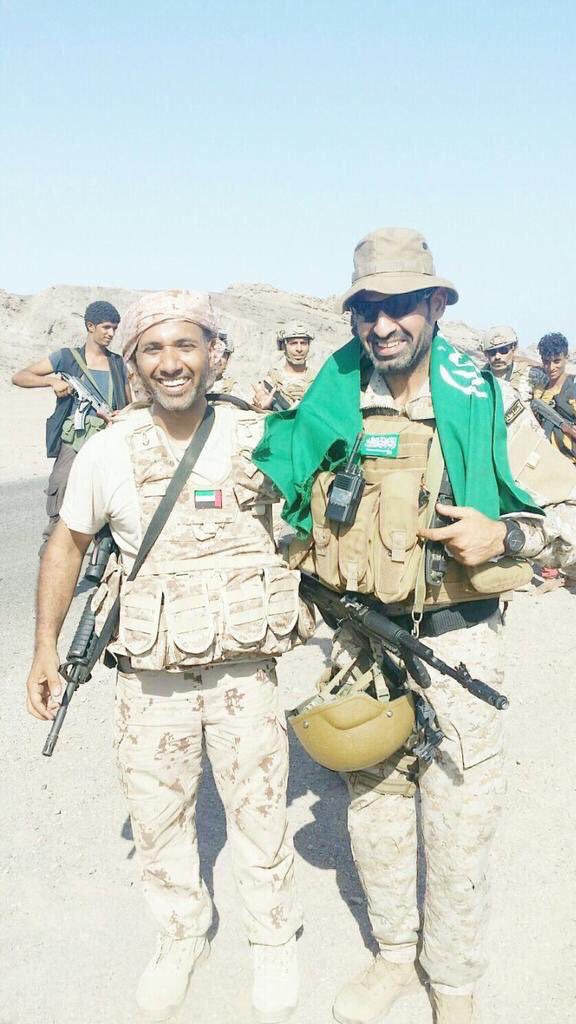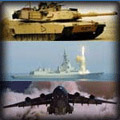Intervención militar en Yemen
Moderadores: Lepanto, poliorcetes, Edu, Orel
Re: Intervención militar en Yemen
Quien le suministra las armas a los houties?.
Para tumbar un abrams no deben ser con cualquier cosa.
Enviado desde mi GT-I9300 mediante Tapatalk
Para tumbar un abrams no deben ser con cualquier cosa.
Enviado desde mi GT-I9300 mediante Tapatalk
- ModeJu
- Mensajes: 201
- Registrado: Dom May 03, 2015 10:51 pm
Re: Intervención militar en Yemen
ModeJu escribió:Quien le suministra las armas a los houties?.
Para tumbar un abrams no deben ser con cualquier cosa.
Enviado desde mi GT-I9300 mediante Tapatalk
No es que los tumben,es que en la mayoría de los casos sus ocupantes los abandonan tal cual esta y salen por patas.
Saludos.
El que no tiene una buena cabeza para predecir,ha de tener una buena espalda para aguantar.
Solo quien se da por vencido,esta perdido.
Solo quien se da por vencido,esta perdido.
-

Pertur - Mensajes: 678
- Registrado: Dom Ago 23, 2009 1:03 pm
Re: Intervención militar en Yemen
poliorcetes escribió:Pues medal, soluciónanos la duda: wahhabismo o wahabismo?
Tal y como escribimos nosotros los árabes es la segunda. En el mundo árabe, con la occidentalización del idioma y los sms, la única vez que se doblan las consonantes es cuando "se acentúan las consonante", como la palabra tanque, Dabbabah, que la B resuena como si fuera acentuada. La H aspirada (como House en ingles) se representa con un "7" y la H semiaspirada árabe como en Wahabi es una "h" y ya esta.
Ahora bien, aqui los occidentales lo escriben con doble h la semisaspirada como "wahhabi" y con una "h" la aspirada de "House". El problema aquí es que acentúan poniendo un apóstrofe como en la palabra tanque "Dab'babah" o doblando la consonante "Dabbabah", eso ya es un lio, y cuando la H semiaspirada está al final de la palabra nunca la doblan justamente como la palabra Dabbabah.
Depende de qué estilo quieras usar y a quien te quieras dirigir vale uno u otro. Pero el primero siempre va a ser más correcto fonéticamente y el segundo más bonito para un occidental que le da igual como suene o deje de sonar la palabra. Yo con mi madre, por ejemplo,me escribo con el primer estilo y la entiendo perfectamente, mejor de lo que entiendo a veces a los occidentales escribir en árabe.
Un saludo
Dulce Bellum Inexpertis Est
-

MedalOfHorror - Mensajes: 572
- Registrado: Lun Dic 30, 2013 7:47 pm
Re: Intervención militar en Yemen
Pues sí, lo de Arabia Saudí... ya puede tener EFAs, F-15SA y Abrams que si los usa así de nada sirven.
Escucha también el Podcast:
https://www.youtube.com/channel/UCuBzQorV74eTFq8HlK7-zRA
https://www.ivoox.com/podcast-portierramaryaire-podcast_sq_f1456223_1.html
Y tenemos un Patreon:
https://www.patreon.com/portierramaryaire
https://www.youtube.com/channel/UCuBzQorV74eTFq8HlK7-zRA
https://www.ivoox.com/podcast-portierramaryaire-podcast_sq_f1456223_1.html
Y tenemos un Patreon:
https://www.patreon.com/portierramaryaire
-

Orel - Moderador
- Mensajes: 46137
- Registrado: Sab Sep 24, 2005 11:33 am
- Ubicación: España, en el bocho
Re: Intervención militar en Yemen
MedalOfHorror escribió:poliorcetes escribió:Pues medal, soluciónanos la duda: wahhabismo o wahabismo?
Tal y como escribimos nosotros los árabes es la segunda. En el mundo árabe, con la occidentalización del idioma y los sms, la única vez que se doblan las consonantes es cuando "se acentúan las consonante", como la palabra tanque, Dabbabah, que la B resuena como si fuera acentuada. La H aspirada (como House en ingles) se representa con un "7" y la H semiaspirada árabe como en Wahabi es una "h" y ya esta.
Ahora bien, aqui los occidentales lo escriben con doble h la semisaspirada como "wahhabi" y con una "h" la aspirada de "House". El problema aquí es que acentúan poniendo un apóstrofe como en la palabra tanque "Dab'babah" o doblando la consonante "Dabbabah", eso ya es un lio, y cuando la H semiaspirada está al final de la palabra nunca la doblan justamente como la palabra Dabbabah.
Depende de qué estilo quieras usar y a quien te quieras dirigir vale uno u otro. Pero el primero siempre va a ser más correcto fonéticamente y el segundo más bonito para un occidental que le da igual como suene o deje de sonar la palabra. Yo con mi madre, por ejemplo,me escribo con el primer estilo y la entiendo perfectamente, mejor de lo que entiendo a veces a los occidentales escribir en árabe.
Un saludo
Sukran
Nunca digas que éste es mi último sendero
**
podcast de portierramaryaire
https://www.ivoox.com/podcast-portierra ... 223_1.html
y recuerda nuestro patreon para actualizar el foro y crecer
https://www.patreon.com/portierramaryaire
**
podcast de portierramaryaire
https://www.ivoox.com/podcast-portierra ... 223_1.html
y recuerda nuestro patreon para actualizar el foro y crecer
https://www.patreon.com/portierramaryaire
-

poliorcetes - Site Admin
- Mensajes: 13139
- Registrado: Vie Abr 17, 2009 11:54 am
Re: Intervención militar en Yemen
Gulf Monarchies Love Mercenaries
by Thomas Baron via War is Boring
Broadcasted by You at 22:59
Edit
In an attempt to bolster its ground operations in Yemen, the Saudi-led coalition has contracted 800 former Colombian soldiers as part of the fight for Aden against militant factions linked to Al Qaeda in the Arabian Peninsula and the Islamic State.
It is unclear which state contracted the fighters, but reports suggest they are fighting under UAE command while wearing Saudi uniforms on the ground.
The first 100 soldiers arrived in Yemen in early October, drawn to the desert war by the promise of better salaries — each fighter will be paid $1,000 a week more than at home. The promise of instant citizenship to the UAE if they survive their three-month contract is an obvious draw.
“We are called mercenaries, traitors, cowards and opportunists,” one retired officer told Colombian newspaper El Tiempo. “We are nothing like that. We are men who made a decision in response to a lack of [financial] guarantees [at home].”
WIB icon
The Gulf states’ ruling families have a long history of relying on experienced foreign fighters to bolster their security forces — often at the expense of their own populations — and to help ensure stability.
Even after the former British dependencies in the Gulf region became independent, they continued to rely on British security officers and ex-soldiers to run operations. These men included Timothy Creasey, the commander and then deputy commander-in-chief of Oman’s armed forces in the 1970s and ’80s, and Ian Henderson — known as the Butcher of Bahrain — who headed that country’s General Directorate for State Security Investigations from 1966 to 1998.
The recruitment of trained, experienced British personnel allowed the Gulf states to quickly build professional security forces, while having foregone the experience of fighting modern wars. During the pre-independence era, the United Kingdom guaranteed the security of these states from outside aggressors, while actual conflicts were characterized by local raiding parties and nomadic expeditions.
A bullet casing flies when a member of the Colombian assault team fires his service rifle during a weapons familiarization event July 22 at the Colombian National Training Center in Fort Tolemaida, Colombia, in preparation for Exercise Fuerzas Comando. Colombia is the reigning champion of the special operations skills competition and has won the event five times overall.
A Colombian soldier fires his weapon. U.S. Department of Defense photo
In moments of crisis, the use of mercenaries have allowed Gulf armies to bolster their forces when necessary, a cheaper option than maintaining large national armies. As a result, the Gulf states have some of the smallest standing armies in the world, with only Saudi Arabia’s military being of substance.
During the crisis in Oman in the 1960s and ’70s, for example, the Sultan hired mercenaries from Australia with experience fighting in Vietnam to help tackle the Marxist Dhofar Rebellion on the ground.
In recent years, Western mercenaries have given way to a cheaper mix of South American — mostly Colombian — fighters with experience battling insurgents, and Muslims from the surrounding Arab countries, Pakistan, Malaysia, Indonesia and Somalia.
In 2010, Sheikh Mohamed bin Zayad Al Nahyah of Abu Dhabi secretly contracted Erik Prince — founder of the controversial private security firm Blackwater — to build a special operations unit tasked with anti-terrorism operations, defending pipelines and skyscrapers and suppressing international revolts.
A White House spokesperson claimed the sheikh’s reasoning derived from the UAE military’s lack of experience and “to show that they are not to be messed with.” These recruits came mainly from Colombia but also South Africa, sparing the sheikh the need to recruit locals.
Hiring mercenaries also lets the Gulf states conduct sensitive security operations without embroiling the military in the socio-political and sectarian conflicts of the state. This is important for a region with a historical legacy of military coups that overthrow unpopular monarchies. These same regimes also cannot guarantee that their populations would remain loyal in the event of a crisis.
The monarchical states of the Gulf are not immune to these problems. U.S. Pres. Barack Obama warned as recently as April that these regimes were at risk from “populations that, in some cases, are alienated, youth that are underemployed, an ideology that is destructive and nihilistic, and in some cases, just a belief that there are no legitimate political outlets for grievances.”
Soldiers assigned to the 7th Battalion, 180th Brigade of the Royal Saudi Land Forces, stand in front of their equipment after the opening ceremony for Friendship and Ironhawk III, at the Northwest Tactical Training Center in Tabuk, Saudi Arabia, April, 5, 2014. The two-week-long exercise enables U.S. and Saudi forces the opportunity to share capabilities while enhancing levels of cooperation and interoperability between the two partner nations. (U.S. Army photo by Staff Sgt. Andrew Porch, 2nd ABCT PAO, 4th Infantry Division)
Above and at top — Saudi ground troops. U.S. Army photos
By keeping small armies mostly staffed by outsiders, the monarchies can more greatly assure their own survival in the long term, the soldiers themselves having no loyalty except to their paychecks. They have few qualms about suppressing political uprisings or opponents of the ruling power, sometimes in violation of international norms of human rights.
In March 2011, a month after the Bahraini uprising began, advertisements appeared in Pakistani media calling for “manpower for Bahrain National Guard” with “previous experience” in the army or police. Bahrain reportedly recruited as many as 2,500 Pakistani servicemen to help suppress the rebellion, although official numbers are hard to come by.
Other mercenaries recruited from Malaysia and Sudan often had little to no knowledge of Arabic or local customs.
State officials refute these reports, claiming that Bahraini citizens comprise the security forces. This is technically true, but misleading, as it’s common practice for Bahrain to grant these recruits citizenship. Critics claim that this is an attempt by Bahrain’s rulers to reduce the majority Shia population — a criticism further confirmed by the de-nationalisation of Shia dissidents in recent years — and shape the voter base in favor of the ruling Sunni monarchy.
The Islamic Human Rights Commission have called these tactics part of an “ongoing project of demographic sectarian change to marginalize the Shia Muslim citizens in Bahrain.”
The recruitment of mercenaries by the Gulf monarchies is only possible due to the immense oil wealth these countries enjoy. The money they can promise these fighters acts as a clear draw, and their indifference to the political reality on the ground makes them less resistant to suppressing opponents of the ruling families.
http://warisboring.com/articles/gulf-mo ... rcenaries/
Nunca digas que éste es mi último sendero
**
podcast de portierramaryaire
https://www.ivoox.com/podcast-portierra ... 223_1.html
y recuerda nuestro patreon para actualizar el foro y crecer
https://www.patreon.com/portierramaryaire
**
podcast de portierramaryaire
https://www.ivoox.com/podcast-portierra ... 223_1.html
y recuerda nuestro patreon para actualizar el foro y crecer
https://www.patreon.com/portierramaryaire
-

poliorcetes - Site Admin
- Mensajes: 13139
- Registrado: Vie Abr 17, 2009 11:54 am
Re: Intervención militar en Yemen
La empresa que creó Erik Prince para Emiratos Árabes Unidos se llama Reflex Response. Saltó la noticia en 2011. Véase por ejemplo, en el New Yorker y en el New York Times. Cuando el asunto salió a a luz, Erik Prince se desvinculó del asunto y terminó montando una empresa de inversiones en África y haciendo negocios con China. El asunto salió en la prensa española dos años más tarde.
-

FlancoSur - Mensajes: 24
- Registrado: Mar Nov 10, 2015 1:07 pm
Re: Intervención militar en Yemen
Estado Islámico ha asesinado ayer al gobernador de Aden y sus 8 guardaespaldas con un coche bomba; el país se desliza, más si cabe, hacia el caos más absoluto.
Curioso que después de varios meses de campaña aérea de los golfos, "bastante exitosa" según algunos "expertos" occidentales:
- Estado Islámico se haya establecido en Yemen, donde antes de la intervención no tenía presencia, incluso controlando partes de Aden.
- Al Qaeda controle más territorio que nunca antes de la intervención, incluidas algunas zonas de la costa.
- La coalición de los golfos no haya bombardeado ni una sola vez, es decir, 0 veces, a las posiciones de Al Qaeda o de Estado Islámico.
Por cierto, habría que abrir un nuevo hilo sobre "Invasión de Arabia Saudí" puesto que buena parte de los combates se desarrollan actualmente en su propio territorio, pese a la campaña aérea "bastante eficaz".

Salu2
Curioso que después de varios meses de campaña aérea de los golfos, "bastante exitosa" según algunos "expertos" occidentales:
- Estado Islámico se haya establecido en Yemen, donde antes de la intervención no tenía presencia, incluso controlando partes de Aden.
- Al Qaeda controle más territorio que nunca antes de la intervención, incluidas algunas zonas de la costa.
- La coalición de los golfos no haya bombardeado ni una sola vez, es decir, 0 veces, a las posiciones de Al Qaeda o de Estado Islámico.
Por cierto, habría que abrir un nuevo hilo sobre "Invasión de Arabia Saudí" puesto que buena parte de los combates se desarrollan actualmente en su propio territorio, pese a la campaña aérea "bastante eficaz".
Salu2
- Bruno Amstel
- Mensajes: 398
- Registrado: Mar Nov 17, 2015 11:23 pm
Re: Intervención militar en Yemen
Una intervención aérea puede ser bastante exitosa como tal, pero si no va acompañada de ofensiva terrestre quedarse diluída en el resultado final. No es el único ejemplo por desgracia.
Escucha también el Podcast:
https://www.youtube.com/channel/UCuBzQorV74eTFq8HlK7-zRA
https://www.ivoox.com/podcast-portierramaryaire-podcast_sq_f1456223_1.html
Y tenemos un Patreon:
https://www.patreon.com/portierramaryaire
https://www.youtube.com/channel/UCuBzQorV74eTFq8HlK7-zRA
https://www.ivoox.com/podcast-portierramaryaire-podcast_sq_f1456223_1.html
Y tenemos un Patreon:
https://www.patreon.com/portierramaryaire
-

Orel - Moderador
- Mensajes: 46137
- Registrado: Sab Sep 24, 2005 11:33 am
- Ubicación: España, en el bocho
Re: Intervención militar en Yemen
Orel escribió:Una intervención aérea puede ser bastante exitosa como tal, pero si no va acompañada de ofensiva terrestre quedarse diluída en el resultado final. No es el único ejemplo por desgracia.
La campaña aérea va acompañada de una ofensiva terrestre de los golfos (también participa Sudán e incluso Eritrea) y sus aliados locales, supongo que "bastante exitosa" según su criterio, aunque no han atacado ni una sola vez por tierra a Al Qaeda ni a Estado Islámico.
Casualidad ??? Seguro que no.
Salu2
- Bruno Amstel
- Mensajes: 398
- Registrado: Mar Nov 17, 2015 11:23 pm
Re: Intervención militar en Yemen
Si ayer se hablaba de 7 mercenarios al servicio de EAU muertos (1 australiano y 6 colombianos), hoy ya se habla de 15 muertos: 1 australiano, 2 británicos, 1 francés, 1 mejicano y 10 colombianos.
Salu2
Salu2
- Bruno Amstel
- Mensajes: 398
- Registrado: Mar Nov 17, 2015 11:23 pm
Re: Intervención militar en Yemen
La coalicion arabe recuperas las islas de yemen.
http://www.europapress.es/internacional ... 02738.html
Esto esta bien porque les corta vias de suministros.
http://www.europapress.es/internacional ... 02738.html
Esto esta bien porque les corta vias de suministros.
-

METEORSWARM - Mensajes: 413
- Registrado: Mar Oct 07, 2008 12:52 am
Re: Intervención militar en Yemen
Bruno Amstel escribió:Orel escribió:Una intervención aérea puede ser bastante exitosa como tal, pero si no va acompañada de ofensiva terrestre quedarse diluída en el resultado final. No es el único ejemplo por desgracia.
La campaña aérea va acompañada de una ofensiva terrestre de los golfos (también participa Sudán e incluso Eritrea) y sus aliados locales, supongo que "bastante exitosa" según su criterio, aunque no han atacado ni una sola vez por tierra a Al Qaeda ni a Estado Islámico.
Casualidad ??? Seguro que no.
Salu2
Como van a bombardear a sus franquiciados...
Saludos.
El que no tiene una buena cabeza para predecir,ha de tener una buena espalda para aguantar.
Solo quien se da por vencido,esta perdido.
Solo quien se da por vencido,esta perdido.
-

Pertur - Mensajes: 678
- Registrado: Dom Ago 23, 2009 1:03 pm
Re: Intervención militar en Yemen
Cosas veredes: Yemen tranforma misiles SAM S-75 guiados en cohetes no guiados para usarlos como arma tierra-tierra:
http://alert5.com/2015/12/14/yemen-modi ... di-arabia/
http://alert5.com/2015/12/14/yemen-modi ... di-arabia/
Escucha también el Podcast:
https://www.youtube.com/channel/UCuBzQorV74eTFq8HlK7-zRA
https://www.ivoox.com/podcast-portierramaryaire-podcast_sq_f1456223_1.html
Y tenemos un Patreon:
https://www.patreon.com/portierramaryaire
https://www.youtube.com/channel/UCuBzQorV74eTFq8HlK7-zRA
https://www.ivoox.com/podcast-portierramaryaire-podcast_sq_f1456223_1.html
Y tenemos un Patreon:
https://www.patreon.com/portierramaryaire
-

Orel - Moderador
- Mensajes: 46137
- Registrado: Sab Sep 24, 2005 11:33 am
- Ubicación: España, en el bocho
Re: Intervención militar en Yemen
Ayer con un Tochka han matado al jefe de las FFEE saudis en Yemen, así cómo a un destacado oficial de las FFEE emiratíes.
El misil fue lanzado sobre el CG de las tropas de la coalición golfa en Taiz y habría causado más de un centenar de víctimas saudís, emiratís y marroquís, incluyendo mercenarios extranjeros.

Salu2
El misil fue lanzado sobre el CG de las tropas de la coalición golfa en Taiz y habría causado más de un centenar de víctimas saudís, emiratís y marroquís, incluyendo mercenarios extranjeros.

Salu2
- Bruno Amstel
- Mensajes: 398
- Registrado: Mar Nov 17, 2015 11:23 pm
¿Quién está conectado?
Usuarios navegando por este Foro: No hay usuarios registrados visitando el Foro y 6 invitados
